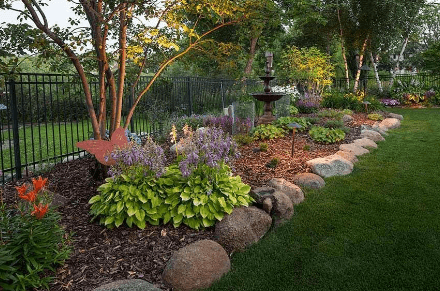Wholesale Landscape Supply: A Comprehensive Guide to Sourcing and Selecting the Best Materials for Landscaping Projects

Landscaping is more than just an aesthetic practice; it’s an essential component of environmental design, contributing to the beauty, functionality, and sustainability of outdoor spaces. Whether you are a professional landscaper, a contractor, or a homeowner embarking on a significant landscaping project, sourcing materials from a wholesale landscape supply is crucial for ensuring both quality and cost-efficiency. In this article, we will explore the various aspects of wholesale landscape supply, including the types of materials available, the benefits of buying wholesale, how to choose the right supplier, and tips for maximizing value in your landscaping projects.
Understanding Wholesale Landscape Supply
What is Wholesale Landscape Supply?
Wholesale landscape supply refers to the bulk purchasing of materials used in landscaping projects, typically at a reduced price compared to retail. These materials can range from plants, trees, and shrubs to hardscape materials like stones, pavers, and mulch, as well as essential tools and equipment.
Buying wholesale is common practice among professional landscapers and contractors, as it allows them to obtain large quantities of high-quality materials at a lower cost. Homeowners with large projects or those who plan to maintain their landscapes over time also benefit from buying wholesale.
Why Choose Wholesale Over Retail?
The primary advantage of purchasing landscape supplies wholesale is cost savings. When materials are purchased in bulk, suppliers can offer them at a lower per-unit price. This reduction in cost can be significant, especially for large-scale projects. Other benefits include:
- Consistency in Quality: Wholesale suppliers often work directly with manufacturers or growers, ensuring that the materials are consistent in quality. This is particularly important for projects that require uniformity in materials, such as building a stone pathway or planting a row of hedges.
- Availability of a Wide Range of Products: Wholesale suppliers typically stock a broad range of products, giving you more options to choose from. This variety makes it easier to find exactly what you need for your project without having to source materials from multiple places.
- Support and Expertise: Many wholesale suppliers specialize in specific types of landscaping materials, allowing them to offer expert advice and support. This guidance can be invaluable when selecting the right products for your specific needs.
Who Can Benefit from Wholesale Landscape Supply?
- Professional Landscapers: Landscapers often manage multiple projects simultaneously, requiring large quantities of materials. Buying wholesale allows them to meet project demands without exceeding budget constraints.
- Contractors: Contractors working on outdoor construction projects, such as building patios, walkways, or retaining walls, can benefit from purchasing hardscape materials in bulk.
- Homeowners: Those taking on significant DIY landscaping projects, such as installing a new lawn or creating a garden, can save money and ensure they have all the materials needed by purchasing wholesale.
Types of Wholesale Landscape Supplies
The range of materials available through wholesale landscape suppliers is extensive, covering all the essential components required for any landscaping project. Below is an overview of some of the most common categories.
1. Plants and Trees
Plants and trees are the foundation of any landscape, providing structure, color, and life to outdoor spaces. Wholesale suppliers typically offer a wide variety of:
- Trees: Shade trees, ornamental trees, and fruit trees are commonly available, with varieties suited to different climates and soil conditions.
- Shrubs: Evergreen and deciduous shrubs that can be used for borders, hedges, or as standalone features.
- Perennials and Annuals: Flowering plants that return each year or those that bloom for a single season, offering a range of colors and textures.
- Ground Covers: Low-growing plants that spread across the ground, used to cover large areas or control erosion.
2. Soil and Mulch
Soil and mulch are essential for plant health, providing nutrients, retaining moisture, and suppressing weeds.
- Topsoil: High-quality soil that forms the top layer, suitable for planting beds, lawns, and gardens.
- Compost: Organic material added to soil to improve its fertility and structure.
- Mulch: Available in various types, including wood chips, bark, and straw, mulch helps retain soil moisture, prevent erosion, and control weeds.
3. Hardscape Materials
Hardscape materials add structure and functionality to a landscape, forming paths, walls, patios, and more.
- Pavers and Bricks: Used to create walkways, driveways, and patios. Available in a variety of shapes, sizes, and colors.
- Stone and Gravel: Natural stone and gravel can be used for paths, driveways, and decorative features. They also serve as a base material for other hardscapes.
- Boulders and Rocks: Large rocks and boulders are often used as focal points in landscaping, adding texture and interest.
4. Irrigation and Drainage Systems
Efficient water management is crucial in landscaping to ensure the health of plants and prevent water waste.
- Irrigation Systems: These include sprinkler systems, drip irrigation, and soaker hoses, all designed to deliver water efficiently to plants.
- Drainage Solutions: French drains, drainage pipes, and catch basins help manage excess water, preventing erosion and waterlogging.
5. Landscape Fabrics and Edging
These materials help define spaces and control unwanted plant growth.
- Landscape Fabric: A permeable material laid under mulch or stone to prevent weed growth while allowing water to reach the soil.
- Edging: Metal, plastic, or stone edging helps create clean lines between different areas of the landscape, such as between a lawn and a flower bed.
6. Tools and Equipment
The right tools and equipment are essential for any landscaping project, from shovels and rakes to wheelbarrows and power tools.
- Hand Tools: Shovels, rakes, pruners, and other basic tools are vital for planting, digging, and maintenance tasks.
- Power Tools: Lawnmowers, trimmers, and chainsaws are necessary for maintaining larger landscapes.
- Landscape Equipment: Larger equipment like tillers, aerators, and skid-steer loaders may also be available for rent or purchase through wholesale suppliers.
Selecting the Right Wholesale Landscape Supplier
Choosing the right wholesale landscape supplier is crucial to the success of your project. The supplier you select will impact the quality, cost, and availability of the materials you use. Here are some key factors to consider:
1. Reputation and Reliability
Look for suppliers with a strong reputation in the industry. Reviews, testimonials, and referrals from other landscapers or contractors can provide insights into a supplier’s reliability. A reputable supplier will deliver high-quality products on time and offer excellent customer service.
2. Product Range and Availability
Ensure that the supplier offers a comprehensive range of products that meet your project’s needs. It’s also important to check the availability of these products. A good wholesale supplier should have a consistent stock of materials, especially those that are in high demand.
3. Pricing and Discounts
While cost should not be the only factor, it’s important to compare pricing between different suppliers. Many wholesalers offer discounts for bulk purchases or to repeat customers, so inquire about these opportunities. However, be wary of prices that seem too good to be true, as they may indicate lower quality.
4. Delivery and Logistics
Consider the supplier’s delivery options. Can they deliver to your location? Do they offer flexible delivery schedules? Some suppliers may charge extra for delivery, so it’s essential to factor this into your budget. Also, consider the packaging and handling of materials to ensure they arrive in good condition.
5. Expertise and Support
A good wholesale supplier should offer more than just products; they should provide expertise and support. Whether you need advice on selecting the right materials or help with planning your project, a knowledgeable supplier can be a valuable resource.
Maximizing Value in Your Landscaping Projects
Once you’ve selected a wholesale supplier, there are several strategies you can use to maximize the value of your purchases and ensure the success of your landscaping project.
1. Plan Ahead
Proper planning is key to any successful landscaping project. Before purchasing materials, create a detailed plan that outlines your project’s scope, including the types of plants, hardscapes, and other materials you’ll need. This plan will help you determine the quantity of materials required, reducing the risk of over-ordering or running out mid-project.
2. Buy in Bulk
One of the primary benefits of wholesale purchasing is the ability to buy in bulk, which reduces the per-unit cost of materials. Consider buying extra materials that you’ll likely need in the future, such as mulch or topsoil, especially if you have storage space. This approach can save money and ensure you have supplies on hand for maintenance or smaller projects.
3. Seasonal Purchasing
Landscaping materials can vary in price depending on the season. For example, plants may be more expensive during peak planting seasons in spring and fall. If possible, plan your purchases during the off-season when prices are lower. This strategy can result in significant savings, especially for large projects.
4. Negotiate with Suppliers
Don’t be afraid to negotiate with your supplier, especially if you’re making a large purchase. Many wholesalers are willing to offer discounts or price matching to secure your business. Building a good relationship with your supplier can also lead to better deals in the future.
5. Consider Long-Term Maintenance
When selecting materials, consider the long-term maintenance requirements. Choose plants that are well-suited to your climate and soil conditions, which will reduce the need for ongoing care. Similarly, opt for durable hardscape materials that will withstand weathering and use, reducing the need for repairs or replacements.
6. Sustainability Practices
Incorporating sustainable practices into your landscaping project can enhance its environmental impact and may even qualify you for tax incentives or rebates in some areas. For example, using native plants reduces the need for water and fertilizers, while permeable pavers allow rainwater to recharge the groundwater rather than running off into storm drains.
7. Utilize Expertise
Leverage the expertise of your wholesale supplier, especially if they specialize in certain types of landscaping materials. They can provide insights into the best products for your project, recommend alternatives that may be more cost-effective, and offer tips for installation and maintenance.
Conclusion
Wholesale landscape supply is an essential resource for anyone involved in landscaping, from professional contractors to ambitious homeowners. By purchasing materials in bulk, you can save money, ensure the quality and consistency of your supplies, and have access to a wide range of products that meet the demands of your project.
Selecting the right supplier, planning your purchases strategically, and considering long-term maintenance and sustainability are all crucial steps to maximizing the value of your investment in landscape supplies. Whether you’re creating a serene garden retreat, a functional outdoor living space, or a large-scale commercial landscape, the right materials sourced from a reliable wholesale supplier will help you bring your vision to life with efficiency and economy.






